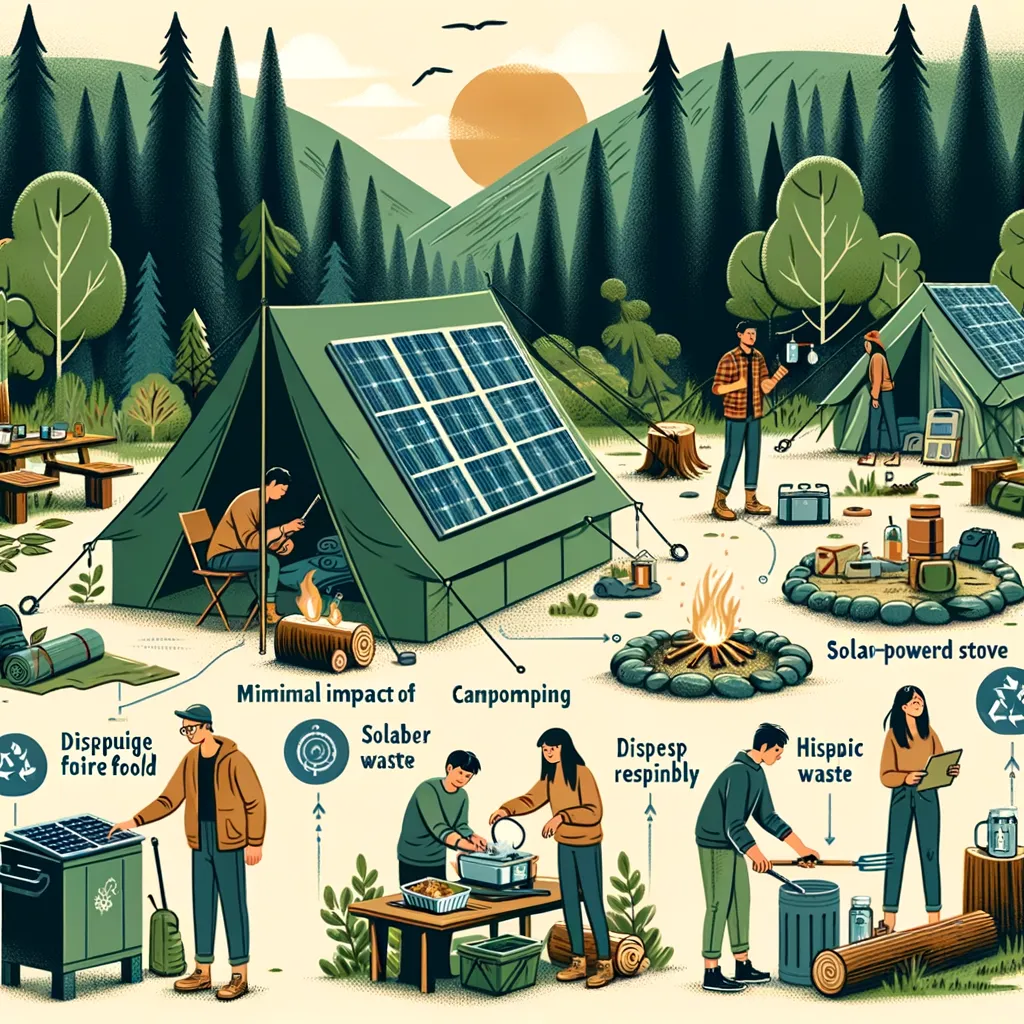The Ultimate Guide to Eco-Friendly Camping
Enthusiastic campers and nature lovers, welcome to your essential handbook on eco-friendly camping! Embracing the great outdoors has always been a source of joy and rejuvenation for many. However, as we explore the whispering woods and towering mountains, it’s crucial to ponder on the traces we leave behind. This guide is dedicated to all passionate adventurers who yearn to minimize their ecological footprint while maximizing the enjoyment of their outdoor escape. Discover how simple, mindful practices can enrich your experience and preserve the natural splendor for future generations to enjoy.
Understanding the essence of eco-friendly camping is not just about reducing waste or using solar-powered gadgets; it’s about fostering a harmonious relationship with nature. By adopting sustainable camping practices, we contribute to conservation efforts and the protection of wildlife habitats. Delve into this guide to learn how you can embark on a memorable, responsible journey into the wilderness. From selecting eco-conscious gear to practicing Leave No Trace principles, we’ve got you covered. For those eager to dive deeper into the world of camping, Visit Camping
and Learn more here for comprehensive insights.
Choosing Eco-Friendly Camping Gear
Embarking on an eco-friendly camping journey begins with thoughtful preparation and selecting the right gear. Opt for products made from recycled materials, sustainably sourced, and designed with durability in mind. High-quality, reusable camping essentials not only lessen the environmental impact but also prove to be economical in the long run. Consider investing in solar-powered lanterns, biodegradable soap, and lightweight, compact cookware designed for outdoor use. Remember, every eco-conscious decision contributes to a larger cause.
Planning Your Eco-Campsite
Where you set up camp significantly influences your ability to leave no trace. Aim for established campsites to avoid disrupting untouched natural areas. Utilize existing fire rings and camping platforms, and always maintain a safe distance from water sources to protect local ecosystems. This section will guide you through selecting the perfect spot that aligns with eco-friendly principles while ensuring a serene and safe outdoor experience.
Adopting Leave No Trace Principles
The Leave No Trace Center for Outdoor Ethics outlines seven principles designed to minimize our impact on the environment. These include planning ahead and preparing, camping and traveling on durable surfaces, disposing of waste properly, leaving what you find, minimizing campfire impacts, respecting wildlife, and being considerative of other visitors. Integrating these principles into your camping routine is easier than you might think and goes a long way in preserving the great outdoors for everyone to enjoy.
The Ultimate Guide to Eco-Friendly Camping for Parents
Welcome, eco-conscious families! Preparing for a camping trip with your loved ones is an adventure in itself, especially when you aim to do it in an environmentally friendly way. This comprehensive guide is tailored specifically for parents who are keen to teach their children the importance of preserving nature while enjoying quality time together in the great outdoors. Discover the joy of eco-friendly camping and introduce your family to sustainable practices that make every outdoor escapade memorable and meaningful.
1. Educating Your Children about Environmental Conservation
Before you venture out, take the time to talk with your children about why eco-friendly camping matters. Discuss the impact of human activity on wildlife and natural habitats, and explain simple concepts like the importance of not leaving trash behind. Engaging in such discussions not only prepares them for an eco-conscious trip but also instills lifelong values of environmental stewardship.
2. Packing Light and Right
Packing is an art, especially when you’re aiming to minimize waste and environmental impact. Encourage your family to pack light, bringing only what is necessary to reduce excess waste. Opt for reusable containers, eco-friendly toiletries, and avoid single-use plastics. Investing in high-quality, durable gear can make a significant difference. Show your children how to pack efficiently and explain the benefits of each eco-friendly item you bring.
3. Choosing Kid-Friendly Eco-Camping Gear
Selecting the right gear is crucial for any camping trip, more so for an eco-friendly one. Focus on sustainable, durable materials and products designed for repeated use. From bamboo toothbrushes to solar-powered flashlights, involve your kids in the process of choosing gear that’s kind to the planet. This is a great opportunity to discuss the importance of sustainability and how eco-friendly products can be just as effective, fun, and useful as their conventional counterparts.
4. Engaging with Nature Responsibly
While camping, encourage your children to interact with nature in a mindful way. Teach them to observe wildlife from a distance, not to pick plants, and to stay on designated trails. Highlight the significance of leaving environments as they were found or even better, for the next visitors. Activities like bird watching, nature walks, and scavenger hunts can help children learn about the environment while emphasizing the importance of conservation.
5. Instilling Leave No Trace Principles
The Leave No Trace principles are a cornerstone of eco-friendly camping. Educate your children on each principle, using language and examples that are easy for them to understand. Planning and preparing, disposing of waste properly, and respecting wildlife are themes that can shape responsible outdoor behavior. Lead by example, showing your children how these practices are incorporated into every aspect of your camping trip, from setup to tear down.
In conclusion, eco-friendly camping with your family is an enriching experience that extends far beyond the confines of a campsite. It’s about building a foundation of respect and care for the natural world in your children. The lessons learned and the memories created during these camping trips can foster a lifelong commitment to environmental stewardship in young hearts and minds. Each step taken towards eco-friendliness, no matter how small, contributes to a larger effort to protect and preserve our precious ecosystems for generations to come. Let this guide be the start of your journey towards creating enjoyable, sustainable camping traditions with your family.
Disclaimer
The articles available via our website provide general information only and we strongly urge readers to exercise caution and conduct their own thorough research and fact-checking. The information presented should not be taken as absolute truth, and, to the maximum extent permitted by law, we will not be held liable for any inaccuracies or errors in the content. It is essential for individuals to independently verify and validate the information before making any decisions or taking any actions based on the articles.




